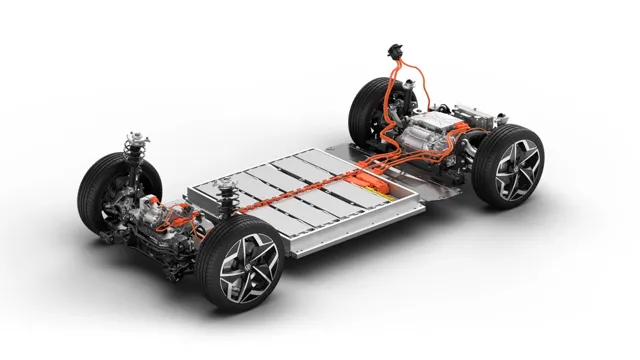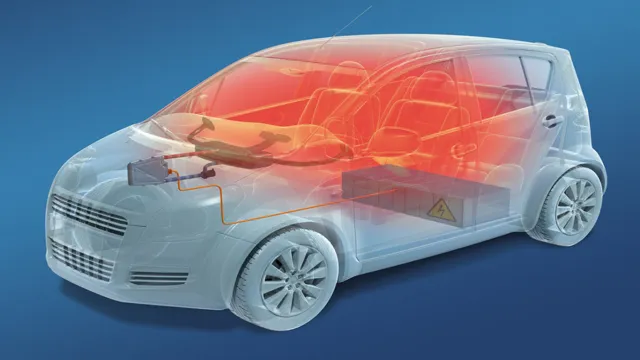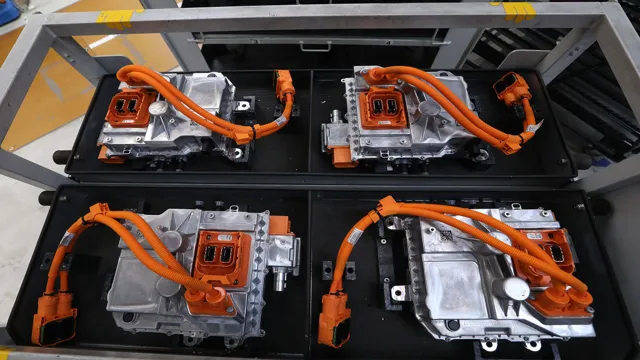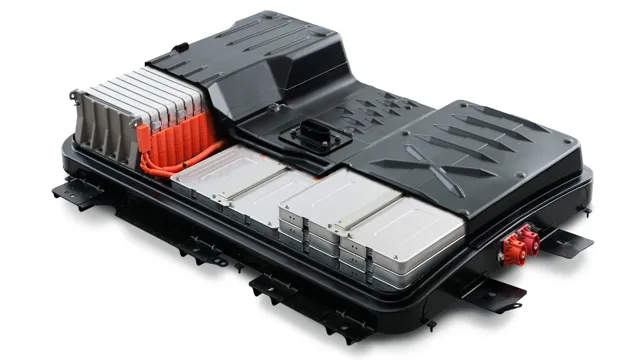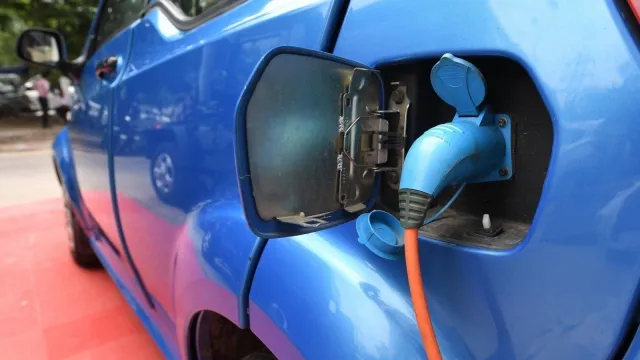Uncovering the Mystery of Battery Capacity for Electric Cars: Everything You Need to Know!
Electric cars are no longer a novelty; they are quickly becoming a mainstream alternative to traditional gas-guzzling vehicles. However, one of the main concerns people have when considering buying an electric car is the battery capacity. How far can you travel on a single charge, and what affects the battery capacity long-term? These are the questions that potential electric car buyers need to answer before making the switch to eco-friendly driving.
In this blog post, we will delve into the topic of battery capacity for electric cars. We’ll explore the factors that contribute to the range of an electric car, and what you can do to maximize its longevity. So, buckle up and get ready to learn all about the heart and soul of electric cars – their batteries.
Overview of Electric Car Batteries
When it comes to electric cars, one of the most crucial aspects is the battery capacity. The battery capacity determines how far an electric car can travel on a single charge, and it’s measured in kilowatt-hours (kWh). Generally, a larger battery capacity allows for a longer driving range.
However, it also means a heavier and more expensive battery pack. The battery technologies used in electric cars vary and are continuously evolving. Lithium-ion batteries are the most common choice, known for their high energy density and long lifespan.
Still, other options, such as solid-state batteries and lithium-sulfur batteries, are being developed for future electric cars. As technology advances, battery capacity for electric cars is expected to increase, making electric vehicles more accessible and practical for everyday use.
Types of Batteries Available
Electric car batteries are the heart of every electric vehicle, allowing them to run smoothly and without harmful emissions. There are mainly two types of batteries commonly used in electric cars: Nickel-Metal Hydride (NiMH) and Lithium-Ion (Li-ion). The NiMH batteries are heavier and larger than the Li-ion ones, and they are also more affordable.
However, Li-ion batteries have a higher energy density, meaning that they can store more power in the same amount of space. These batteries are also lighter, more efficient, and have a longer life span, making them the preferred choice for many electric vehicle manufacturers. Additionally, different chemistries can be used within Li-ion batteries to optimize performance, such as cobalt-based, manganese-based, or iron-based chemistries.
With advancements in battery technology, it is now possible for electric cars to travel longer distances before needing to recharge, and with further developments, we can expect this distance to increase, making electric vehicles a more viable option for drivers worldwide.
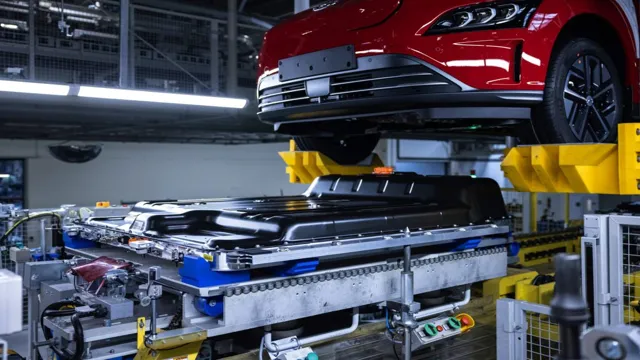
Factors Affecting Battery Capacity
Electric car batteries are crucial components that help to extend the lifespan and reliability of an electric vehicle. The quantity of energy that an electric car battery can hold is referred to as its capacity. There are several variables that affect the battery capacity of an electric car.
One significant factor is temperature. High temperatures can reduce the capacity of a battery, while lower temperatures can increase it. The battery’s age also plays a crucial role in determining its capacity.
As batteries degrade over time, their capacity decreases. Another significant factor that affects battery capacity is the charging and discharging cycles. Using fast chargers or discharging the battery too low can also reduce its capacity.
Thus it’s important that electric car owners opt for regulated and moderate charging speeds to extend the battery’s life. Manufacturers such as Tesla and Chevrolet are constantly upgrading their electric vehicle battery technology to keep up with increasing consumer demand for longer battery life.
Importance of Battery Capacity
When it comes to electric cars, battery capacity is crucial. The battery is what powers the vehicle, so having enough capacity is essential for long trips. The capacity of a battery is measured in kilowatt-hours (kWh), and the higher the number, the more power it can store.
This means that electric cars with larger battery capacities typically have longer ranges and can go further on a single charge. However, larger batteries generally come at a higher cost. This is why it’s important to consider your driving needs before choosing a car with a specific battery capacity.
For those who frequently take long trips, a larger battery capacity may be worth the extra investment, while those who mainly drive short distances may be okay with a smaller battery. Overall, battery capacity is a crucial factor to consider when it comes to choosing an electric car that meets your needs and budget.
Range Anxiety: What It Is and How to Avoid It
When it comes to electric vehicles (EVs), one of the biggest concerns for drivers is range anxiety. This refers to the fear of running out of battery power before reaching their destination. To avoid range anxiety, it’s essential to consider the battery capacity of the EV before purchasing.
A higher battery capacity means the car can travel a longer distance before needing a recharge. Additionally, it’s essential to plan routes before setting off on a journey, ensuring there are plenty of charging stations along the way. Some EV models will even provide information on the nearest charging stations, making it easier to plan your route.
Ultimately, battery capacity plays a significant role in preventing range anxiety, and careful planning can make electric vehicle ownership a practical and enjoyable experience.
Maximizing Battery Capacity: Tips and Tricks
The importance of battery capacity cannot be overstated. It is a critical factor in determining how long you can use your devices without having to recharge them. This is particularly important for people who are always on the go and need their devices to stay alive throughout the day.
In today’s world, smartphones, laptops, tablets, and other electronic gadgets have become an integral part of our lives. However, they all rely on one thing, and that is their battery. If the battery is drained quickly, it can cause frustration and inconvenience to the user.
That is why it’s essential to maximize the capacity of your battery. By following some simple tips and tricks, you can enhance your battery life and ensure that it lasts longer than ever before. So, buckle up and prepare to learn some practical ways to maximize your battery capacity!
Battery Warranty and Replacement Options
When it comes to choosing a battery for your device, the capacity of the battery is a crucial factor to consider. The battery capacity refers to the amount of charge that the battery can hold, and it plays a significant role in determining how long your device can last without requiring a recharge. Therefore, it’s essential to choose a battery that has a higher capacity so that your device can last longer.
Moreover, the battery warranty and replacement options are also equally important. It’s wise to choose a battery that comes with a reliable warranty and replacement policy. This ensures that you can get a replacement or repair if your battery fails prematurely or experiences any defects.
It’s important to consider the capacity, warranty, and replacement options of the battery before making a purchase. Doing so could save you from headaches down the line.
Comparing Battery Capacity
When it comes to electric cars, one of the primary concerns for consumers is the battery capacity. This is because electric cars rely entirely on the battery to power the vehicle, and a larger battery capacity means a longer driving range. However, not all electric cars have the same battery capacity, and it’s important to consider this when shopping for an electric car.
Generally, battery capacity is measured in kilowatt-hours (kWh), and electric cars can have anywhere from 20 kWh to over 100 kWh. It’s important to keep in mind that a larger battery will typically add more weight to the vehicle, which can impact performance and handling. Additionally, a larger battery will require more time to charge fully, which is something to consider if you plan on taking long trips.
Ultimately, the ideal battery capacity for an electric car will depend on factors such as your driving habits, budget, and intended use of the vehicle.
Top Electric Cars by Battery Capacity
Electric cars with high battery capacity are becoming more popular as the demand for electric cars grows. The battery capacity is a crucial factor when considering purchasing an electric car as it determines the car’s range. The higher the battery capacity, the longer the car can travel on one charge.
When comparing electric cars, it’s essential to look at the battery capacity. Tesla Model S Plaid+ has the highest battery capacity currently available in electric cars, with an estimated range of over 520 miles. Other electric cars with high battery capacity include the Lucid Air Dream Edition with an estimated range of over 500 miles, and the Porsche Taycan Turbo S with an estimated range of 201 miles.
It’s worth noting that the battery capacity isn’t the only factor that determines an electric car’s range. Other factors such as driving style and weather conditions can also affect the car’s range. Overall, it’s important to consider the battery capacity when comparing electric cars to ensure you’re getting a car that meets your needs.
Performance Comparison of Electric Car Batteries
When it comes to comparing electric car batteries, one of the key factors to consider is battery capacity. This refers to the amount of energy that a battery can store and provide to power the car’s motor. Different electric car models may have different battery capacities, and this will have an impact on factors such as range, charging time, and overall performance.
For example, a car with a battery capacity of 60 kWh may be able to travel around 200 miles on a single charge, while a car with a battery capacity of 100 kWh may offer a range of closer to 300 miles. Of course, there are many other factors that can affect electric car battery performance, including the efficiency of the motor and the temperature and weather conditions that the car is operating in. But by comparing battery capacity, it is possible to get a better sense of what different electric car models can offer in terms of range and overall performance.
Future of Battery Capacity and Electric Cars
As electric cars become increasingly popular, the demand for battery capacity has grown significantly. The future of battery capacity looks promising with technological advancements focusing on increasing energy density and reducing costs. Electric cars often rely on lithium-ion batteries which are expected to undergo significant advancements over the next few years.
Battery manufacturers are currently working on solid-state batteries, which are expected to have higher energy density than lithium-ion batteries. They will also be safer and more durable, making them more suitable for electric cars. The solid-state batteries are also expected to reduce charging times and improve the range of electric vehicles.
With these technological advancements, we can expect electric cars to have greater range and battery life, which will make them a more viable alternative to traditional gasoline-powered vehicles. As demand for electric cars grows, it’s essential for manufacturers to invest in battery capacity to drive innovation and increase accessibility to electric vehicles for all.
Conclusion
In conclusion, battery capacity for electric cars is kind of like our own personal fuel tank. The bigger the tank, the farther we can go. And just like how we make sure to always have enough gas in our car, it’s important for electric car owners to keep an eye on their battery levels and plan their trips accordingly.
So, let’s make sure to charge up and hit the road with our electric cars, because with great battery capacity comes great driving power.”
FAQs
What is the average battery capacity of an electric car?
The average battery capacity of an electric car is around 60-100 kWh, but this can vary depending on the make and model of the car.
How much distance can an electric car travel on a single charge with a full battery capacity?
The distance an electric car can travel on a single charge with a full battery capacity varies depending on the battery size, vehicle weight, driving style, and other factors. Generally, electric cars can travel between 100-300 miles on a single charge.
How long does it take to fully charge an electric car battery?
The time it takes to fully charge an electric car battery varies depending on the charging method used. Standard home charging can take overnight for a full charge, while fast-charging stations can charge up to 80% in 30-40 minutes.
Do electric cars have different battery capacities for different models or makes?
Yes, electric cars have different battery capacities based on the make and model of the vehicle. Some electric cars have smaller batteries for shorter trips or urban driving, while others have larger batteries for longer distances or towing capabilities.
